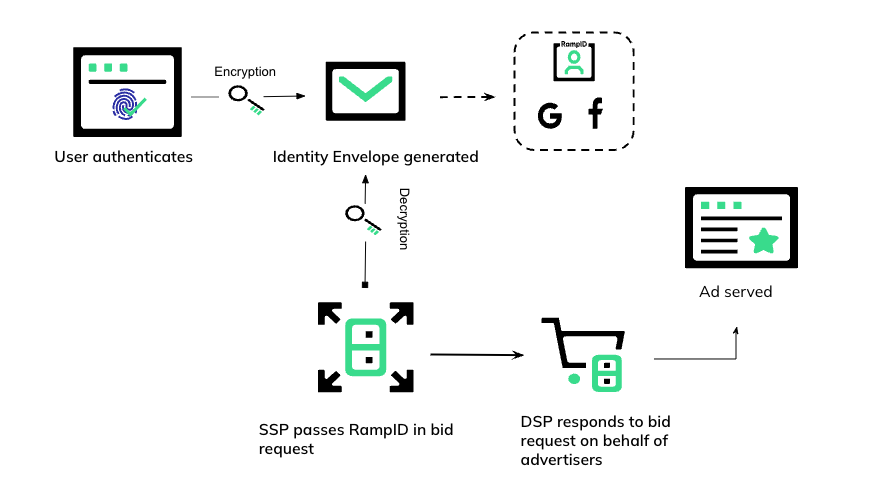Authenticated Traffic Solution
LiveRamp's Authentication Traffic Solutions (ATS) allows publishers to resolve consented user data with a RampID in real-time, enabling people-based advertising on authenticated, cookieless inventory across the open internet.
With ATS, you can efficiently and securely offer your addressable RampID inventory for programmatic targeting in a privacy-conscious way, ensuring relevant ads are served to your users and resulting in an increase in demand from advertisers.
ATS can also be leveraged by marketers who deliver ads through partner platforms such as Pinterest, Meta, or TikTok by implementing it together with our CAPI Connectors. This allows optimized ads delivery and accurate insight into customer journeys without the complexity of building server-side integration.
Once you place the ATS code on your websites, every time a user provides their email address, an encrypted envelope containing a RampID is generated, which is then used in the bidstream.
LiveRamp's RampID, a cookieless and interoperable identity, is deeply integrated across marketers, publishers, and platforms, creating a value exchange ecosystem, enabling targeting and buying inventory at the person-based level across the open web cookieless browsers. ATS is one of the core capabilities that powers the RampID ecosystem, capturing authenticated audiences to maximize reach and addressability amid data deprecations.
How ATS Works
Learn how ATS works when it is implemented on your domains. Starting when a user authenticates until an ad is served on your website.

User authenticates by providing their identifier on your website, for example, through a newsletter sign-up.
ATS obtains the configuration and transforms it into an encrypted identity envelope containing LiveRamp's pseudonymous identifier, RampID. Depending on your ATS integration, these identity envelopes may also contain PAIR IDs, Facebook-scoped envelopes, and other identifiers which you can use to send conversion events for marketer use cases.
When that user who now has an envelope enters a page in your website that contains an ad space, the SSP (Supply-Side Platform) decrypts the envelope with Sidecar and passes the RampID in bid requests to DSP (Demand-Side Platform).
The DSPs will then respond to bid requests automatically on behalf of the advertisers. The winning bid is then delivered to your website and the ad is served to your user.
About RampID
RampID is LiveRamp's universal, pseudonymous identifier that is tied to devices in the LiveRamp Identity Graph. By focusing on people-based resolution, LiveRamp maintains the largest and most accurate people-based identity graph on the market. We match disparate cookies, proprietary platform IDs, mobile devices, and pseudonymized offline touchpoints (such as email addresses, postal addresses and phone numbers) to our common, people-based ID - RampID.
RampID creation involves hashing, salting, and private key encryption in order to prevent consumer data from being re-identified.
ATS Implementations
There are three ways you can implement ATS, depending on your needs and level of technical expertise:
ATS for Web (Javascript Implementation)
ATS for Web is implemented by simply attaching a line of code to the header on all the pages of your website. This line of code is obtained from LiveRamp Console after you’ve configured your ATS setup; which country you want to run ATS in, how the envelopes should be obtained, and so on. The highly automated process allows minimum tinkering with code and makes it possible for people with any level of technical skills to set up.
Additionally, ATS for Web is optimized to be plugged into Prebid.js., enabling bids to take place simultaneously (rather than waterfalling) and boosting the chances of higher revenue with your ad space. ATS Analytics is also available to provide you with valuable insights on your RampID traffic and bid performances.
See "Implement ATS for Web" to get started.
Tip
Implementation Support for Publishers: We provide support to guide you through the ATS implementation! Reach out to ats-publisher@liveramp.com for 1:1 support.
ATS API
If you want to integrate ATS but want to limit added JavaScript on your site, you may prefer to call the ATS API directly. Direct interaction will let you cut down the weight of the page and potentially make fewer client-side network requests but does add to the implementation complexity. We only recommend this method if you know what you're doing.
See the ATS API guide to get started.
ATS Mobile SDK
LiveRamp ATS Mobile SDK provides all the tools you need to handle envelopes from Android and iOS devices more optimally without spending time on tedious codes. The SDK contains built-in functionalities to retrieve, refresh, and cache envelopes while ensuring that user consent is being respected.
See the ATS Mobile SDK guide to get started.